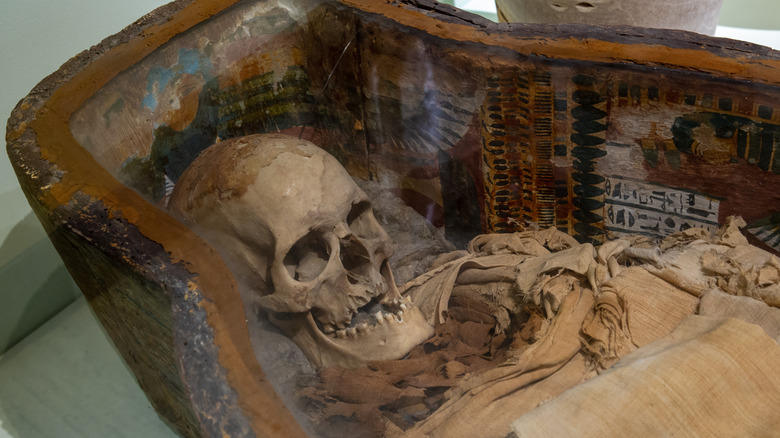When Does A Body Start To Decompose?
We all know that our time on this Earth is fleeting, but what exactly happens to our body after we draw our final breath? According to Australian Museum, death is more of a process than an event, as different parts of us die and decompose at different rates. The process begins when the heart stops beating and the lungs stop taking in air. This means that cells in the body stop receiving the blood and oxygen necessary to function, setting off a chain of reactions that will gradually see the body decompose into a skeleton.
Within three minutes without oxygen, brain cells will start dying, but muscle cells will live on for a few hours. Calcium seeps into these muscles, preventing them from relaxing; within three hours from a stopped heart, rigor mortis will commence and continue for up to 36 hours. The exact time from a stopped heart to skeleton depends on a lot of factors, mainly concerning the environment that the body is in and whether it has been embalmed. An exposed body in hot, summery conditions can be reduced to bones in just nine days, but most will take much longer to reach skeletonization.
Decomposition begins four minutes after death
Decomposition occurs over four main stages, with the first starting as soon as four minutes after death (via Aftermath). Autolysis is caused by the excess carbon dioxide in the body, where the acidic environment brings rigor mortis and small blisters across the body as ruptured cells leak enzymes throughout. These enzymes release gases which cause the second stage, bloat, around three days after death, and bacteria and insects begin to eat the body. This is the infamous putrefaction stage that causes extremely foul odors, and can alert neighbors or passers-by that someone has died should the body have gone unnoticed before.
Things don't get much more pleasant after that. Active decay sees the body become liquified as the blood and organs decompose, beginning eight days after a stopped heart and continuing until after a month. The fourth stage, skeletonization, is the hardest to predict. According to Crime Clean-up, it can go anywhere from a month to several years for a buried body to be reduced to bones. The bones themselves will also decompose, though, in certain conditions, skeletons can last for centuries. Death is a natural process that begins with a stopped heart and continues for weeks, months, and even years afterward; though it's nothing to be ashamed of, it's certainly not the most pleasant process in terms of sight and smell.

